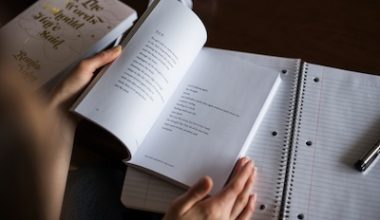English Literature at A-Level is a challenging but rewarding subject. It requires you to develop your critical thinking skills, your understanding of literary texts, your ability to analyze and interpret them, and your ability to write critically about them.
A-level English Literature examines the critical analysis of literary texts. Revising for it can be daunting, but it doesn’t have to be. To do well in your exams, it is important to start revising early and use a variety of revision techniques.
In this article, we will be discussing how to revise for A-level English Literature. By following these simple tips, you can make the revision process more efficient and effective.
Table of contents
What is involved in A-level English Literature?
The course typically involves studying four texts, two from each of the following periods:
- Early Modern (1500-1700)
- Romantic (1780-1830)
- Modern (1890-1945)
- Contemporary (1945-present)
You will also need to write essays and take exams on the texts you have studied. There are two exam papers in A-level English Literature:
- Paper 1: Critical Analysis
- Paper 2: Creative Writing
Related Post: What is a Pass Grade at GCSE and A Level?
What are the A-Level English Literature assessment objectives?
The A-Level English Literature assessment objectives are:
- To demonstrate knowledge and understanding of literary texts
- To develop critical analysis skills
- To write clear and concise essays
- To produce creative writing that is imaginative and engaging
What do you study for English literature at A levels?
The exact texts that you will study for A-Level English Literature will vary depending on your exam board and school. However, some of the most common texts include:
- Shakespeare plays
- Novels by Jane Austen, Charles Dickens, and George Eliot
- Poems by William Wordsworth, John Keats, and T.S. Eliot
- Plays by Harold Pinter and Tom Stoppard
- Novels by Zadie Smith, Kazuo Ishiguro, and Margaret Atwood
Related Post: How To Find The Best A-level Maths Online Tutors In 2024
How can you revise for A-Level English Literature?
There are many different ways to revise for A-Level English Literature. Here are a few tips:
- Use revision cards to revise for A-Level English Literature. Revision cards are a great way to memorize key quotes, characters, and themes from your texts. You can make your revision cards or buy them from a bookstore.
- Use mind maps to revise for A-Level English Literature. Mind maps are a visual way to organize your thoughts about a text. You can use mind maps to brainstorm ideas, summarize key points, or track your progress in your revision.
- Use quizzes to revise for A-Level English Literature. Quizzes are a great way to test your knowledge of your texts. You can find quizzes online or make your own.
- Use past papers to revise for A-Level English Literature. Past papers are a great way to familiarize yourself with the exam format and the types of questions that are asked. You can find past papers online or from your exam board.
- Use videos to revise for A-Level English Literature. There are many videos available online that can help you with your revision. These videos can cover a variety of topics, from literary analysis to essay writing.
- Use school revision sessions to revise for A-Level Literature. Your school may offer revision sessions for A-Level English Literature. These sessions can be a great way to get help from your teachers and to learn from other students.
- Use revision guides to revise for A-Level English Literature. Revision guides can be a helpful resource for your revision. They can provide summaries of the texts, analyses of key themes, and practice questions.
How to Revise for A-level English Literature
- Start early. Don’t wait until the last minute to start revising. The earlier you start, the more time you will have to cover all the material.
- Create a revision timetable. Plan out when you will revise each text and assessment objective. This will help you stay on track and avoid feeling overwhelmed.
- Read your texts carefully. The more familiar you are with the texts, the easier it will be to write about them. Make sure to read them multiple times and take notes on important points.
- Learn key quotations. Being able to quote from the texts will help you to support your arguments in your essays. Please make a list of the most important quotations from each text and practice using them in your writing.
- Practice writing essays. The best way to improve your essay writing skills is to practice. Write essays on different topics from the texts you have studied. Get feedback from your teacher or a tutor on your essays.
- Take practice exams. Many practice exams are available online and in revision guides. Taking practice exams will help you get used to the format of the exams and the types of questions that are asked.
- Get help from your teacher or a tutor. If you are struggling with any aspect of the course, don’t be afraid to ask for help from your teacher or a tutor. They can help you to identify your weaknesses and develop a revision plan.
Related Post: 10 Effective Brain Foods for Studying During Exam Season in 2024
What is the best way to revise for English literature A-level?
There is no one-size-fits-all answer to this question, as the best revision method for you will depend on your learning style and preferences. However, some general tips can help you get the most out of your revision time.
- Start early. The sooner you start revising, the less pressure you will feel, and the more time you will have to understand the material.
- Create a revision timetable. This will help you to stay on track and make sure that you are covering all of the important topics.
- Set realistic goals. Don’t try to cram everything into the last few weeks before the exam. Instead, focus on learning the key concepts and being able to apply them to different texts.
- Use a variety of revision methods. Don’t just read your notes over and over again. Try using different methods, such as making mind maps, flashcards, or practice essays.
- Get feedback on your work. Ask your teacher, tutor, or friend to read your essays and give you feedback on your strengths and weaknesses.
- Take breaks. Don’t try to revise for hours on end without taking a break. Get up and move around, or take a few minutes to relax and clear your head.
How can you achieve an A in your A-Level English Literature exams?
Achieving an A* in A-Level English Literature is a challenging but achievable goal. By following the tips above and working hard, you can give yourself the best possible chance of success.
Here are some additional tips that may help you achieve an A* in your exams:
- Read widely. The more you read, the more familiar you will become with different literary techniques and styles.
- Be analytical. When you read a text, don’t just focus on the plot. Think about the themes, characters, and symbols and how they work together to create meaning.
- Be critical. Don’t be afraid to challenge the text. Ask questions about the author’s intentions, the character’s motivations, and the meaning of the work as a whole.
- Write well. Your essays should be clear, concise, and well-structured. Use evidence from the text to support your arguments, and proofread your work carefully.
- Practice, practice, practice. The more you practice writing essays, the better you will become at it. Try to practice under timed conditions so that you can get used to writing under pressure.
Related Post: Can You Do A Levels at Any Age in College?
Where can you get extra support with your A-Level English Literature revision?
There are a number of resources available to help you with your A-Level English Literature revision. These include:
- Your teacher or tutor. They can provide you with individual help and advice.
- Revision guides. These can provide you with summaries of the key topics and practice questions.
- Online resources. There are a number of websites and apps that can help you with your revision.
- Study groups. These can be a great way to share ideas and learn from each other.
- Extracurricular activities. These can help you to develop your understanding of literature and your writing skills.
How are you graded in A-Level English Literature?
A-Level English Literature is graded on a six-point scale: A*, A, B, C, D, and E. Students who fail to reach the minimum standard for grade E will be recorded as U (unclassified) and will not receive a qualification certificate.
The exam board sets the grade boundaries each year based on the performance of all students taking the exam.
The grading is based on the following criteria:
- Knowledge and understanding of the texts studied
- Ability to analyze and interpret the texts
- Ability to write clearly and concisely about the texts
- Ability to make relevant and supported points
- Overall impression of the candidate’s performance
The exam is 2 hours long and is worth 64 marks. There are two parts to the exam:
- Part 1: 40 marks, consisting of two compulsory questions on one of the set texts.
- Part 2: 24 marks, consisting of two optional questions on either one of the set texts or on a wider range of texts.
The questions in Part 1 are designed to test your knowledge and understanding of the set texts. They may ask you to:
- Explain the plot, characters, or themes of the text.
- Analyze the language or style of the text.
- Compare the text to other texts or to other works of art.
- Discuss the historical or cultural context of the text.
The questions in Part 2 are more open-ended and challenging. They may ask you to:
- Write a critical essay on a particular aspect of the text.
- Explore the relationship between two texts.
- Create your text inspired by the set texts.
What are the different question types in A-Level English Literature?
The best way to prepare for A-Level English Literature is to read widely and critically and to practice answering different types of questions. You should also make sure that you understand the different assessment objectives (AOs) that are being tested.
The different question types in A-Level English Literature are:
- Extract-based questions: These questions ask you to answer questions about a specific extract from a text. You will need to demonstrate your understanding of the text, as well as your ability to analyze its language and techniques. You will also need to identify the key features of the passage, imagery, and structure and explain how they contribute to the meaning of the text.
- Whole-text questions: These questions ask you to answer questions about the text as a whole. You will need to demonstrate your understanding of the text’s plot, characters, themes, and context.
- Comparative questions: These questions ask you to compare two texts. You will need to demonstrate your understanding of both texts, identify similarities and differences between them, and explain how these contribute to their meaning.
- Creative questions: These questions ask you to produce a creative piece of writing, such as a poem, essay, or piece of drama. You will need to demonstrate your understanding of the texts and your ability to use your creativity.
- Critical essay: This type of question asks you to write an essay about a particular aspect of a text. You will need to state your argument, provide evidence from the text to support your argument and discuss the implications of your argument.
FAQs
Some of the most common mistakes students make in A-Level English Literature include:
* Not reading the texts carefully enough.
* Not understanding the key concepts of literary criticism.
Not being able to write a clear and concise essay.
* Not supporting their arguments with evidence from the texts.
* Not answering the question that has been asked.
Some of the best ways to improve your A-level English Literature grades include:
* Reading the texts carefully and taking notes.
* Learning about the key concepts of literary criticism.
Practicing writing essays.
* Getting feedback on your work.
* Attending revision classes or workshops.
There are many resources available to help you with A-Level English Literature, including:
* Your teacher or tutor
* Revision guides
Past paper questions
* Online resources
* Literary magazines and journals
Conclusion
Revising for A-level English Literature can be challenging, but it is important to start early and use a variety of revision techniques. With hard work and dedication, you can achieve your goal of an A* in your exams.
You can make the revision process more efficient and effective by following these tips and you can improve your chances of success in your exams.
References
- lovelearningtutors.com – How to revise for English Literature
- thinkstudent.co.uk – How to revise for A-Level English Literature
- immerse.education – How to revise English Literature A-Level




